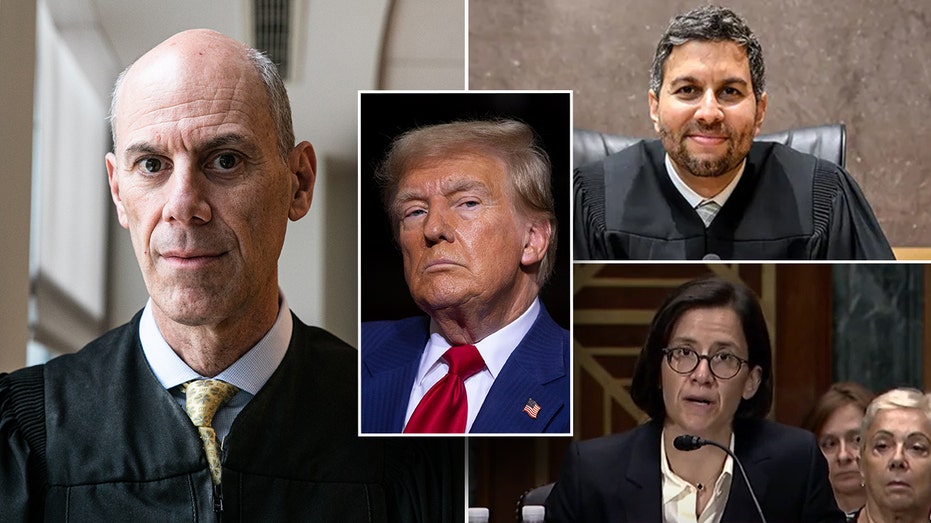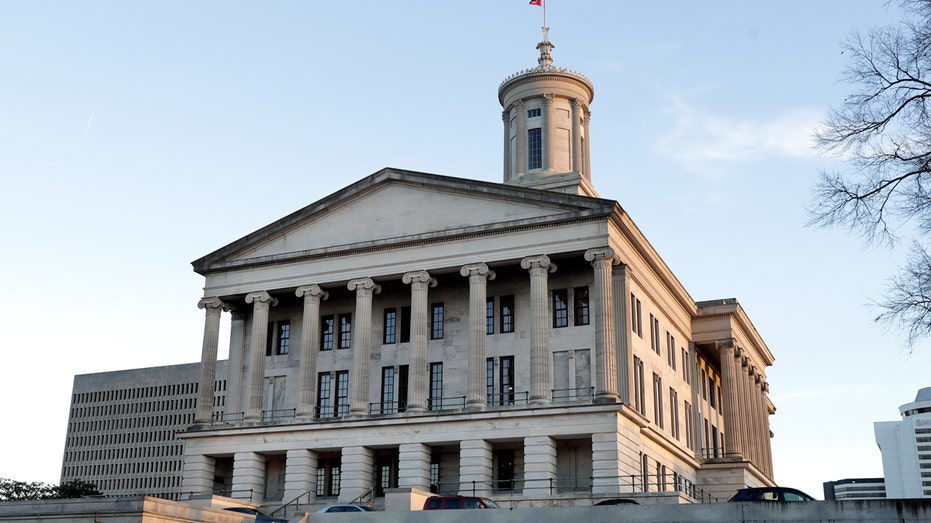West Texas lawmakers push bills to divert some oil and gas taxes to help oil-producing counties with roads, other needs

Reps. Tom Craddick and Brooks Landgraf want to divert 10% of taxes collected on oil and gas production to help budget-strapped counties keep up with growth.
Schumer warns any GOP bid to shutter the Department of Education will be DOA in Senate

Senate Minority Leader Chuck Schumer, D-N.Y., declared if Republicans seek to push a measure through the Senate to shutter the Department of Education, it would be “dead on arrival.” President Donald Trump recently issued an executive order calling for the secretary of education “to the maximum extent appropriate and permitted by law, take all necessary steps to facilitate the closure of the Department of Education and return authority over education to the States and local communities while ensuring the effective and uninterrupted delivery of services, programs, and benefits on which Americans rely.” Trump said during remarks last week that “the department’s useful functions … will be preserved, fully preserved.” DEPARTMENT OF EDUCATION SIGNIFICANTLY DISMANTLED IN NEW TRUMP EXECUTIVE ORDER Regarding the notion of closing the department, Schumer asserted during a floor speech on Monday, “of course Donald Trump cannot proceed without an act of Congress. That’s the law.” “Let me be very clear: If Republicans ever, ever, try to move a bill through the Senate that shuts down the Department of Education, Senate Democrats will halt it in its tracks. It will go nowhere. It will be dead on arrival,” he said. CHUCK SCHUMER FACING ‘UPHILL FIGHT’ AMID LEADERSHIP DOUBTS: ‘MATTER OF WHEN, NOT IF’ Congress created the department less than 50 years ago. “In October 1979, Congress passed the Department of Education Organization Act (Public Law 96-88). Created by combining offices from several federal agencies, the Department began operations in May 1980,” according to the department’s website. LINDA MCMAHON: MY VISION FOR ELIMINATING THE DEPARTMENT OF EDUCATION CLICK HERE TO GET THE FOX NEWS APP Schumer has served in the nation’s legislature for nearly as long as the department has been operating — he started serving in the U.S. House of Representatives in 1981, then moved to the Senate in 1999.
Washington AG joins coalition suing to block Trump’s order to dismantle Department of Education

Washington state’s attorney general has joined 20 other Democrat states in a lawsuit seeking to block President Donald Trump’s executive order that calls to dismantle the Department of Education. The state’s Attorney General Nick Brown announced Monday that he joined 20 other attorneys general in filing a motion for a preliminary injunction against the Trump administration. A preliminary injunction would temporarily pause the president’s March 20 executive order to eliminate the DOE. The other 20 states filed lawsuits on March 13 attempting to block efforts to close the DOE after plans were announced to eliminate half of the department’s workforce. DEM AGS SUE OVER TRUMP ADMINISTRATION’S DEPARTMENT OF EDUCATION LAYOFFS The latest lawsuit seeks to stop the layoffs and the move by the administration to transfer student loan and special education services outside the department, as Trump works to shift responsibilities away from the DOE. For example, Trump announced last week that the Small Business Administration would handle student loans as part of this plan. “The devastating cuts and layoffs at the Department of Education will directly harm Washington’s youth and their families,” Brown said in a statement. “Our office will fight to defend the education and health of our students from President Trump’s illegal order.” SECRETARY OF EDUCATION LINDA MCMAHON PRAISES DEPARTMENT FOR TAKING STEPS TO ELIMINATE ‘BUREAUCRATIC BLOAT’ Layoffs at the department have already led to the closure of the Office of Civil Rights outreach services across the country, which investigated students’ claims of discrimination and sexual assault. Federal funding and approvals for state schools have also been delayed, Brown’s office said. The lawsuit argues that the Trump administration’s executive order is illegal and that efforts to dismantle the DOE can only be authorized by Congress. GOP lawmakers have introduced legislation to eliminate the department, but the effort has not yet been approved by either chamber on Capitol Hill. The lawsuit from the attorneys general also claims that the mass layoffs violate the Administrative Procedures Act, which establishes procedures for how administrative agencies of the federal government may propose and issue regulations.
Can Congress defund federal courts with key Trump budget process?

As Republicans look for ways to rein in federal judges issuing countless orders to halt the Trump administration’s action on immigration in particular, a number of potential avenues for doing so are being considered. However, the use of a key budget process that lowers the Senate’s threshold to 51 votes to defund certain courts could face significant obstacles. Rep. Chip Roy, R-Texas, House Freedom Caucus policy chair and chair of the House Judiciary Committee’s subcommittee on the Constitution, told Fox News Digital he isn’t “for or against” any specific approach to addressing the countrywide injunctions that are throwing a wrench into President Donald Trump’s priorities. CHUCK SCHUMER FACING ‘UPHILL FIGHT’ AMID LEADERSHIP DOUBTS: ‘MATTER OF WHEN, NOT IF’ “We ought to look at [impeachment], we ought to look at jurisdiction-stripping, we ought to look at every option that needs to be addressed about judges that are actively taking steps to try to undermine the presidency,” he said. The Republican added, “I think there are pros and cons of those approaches. I think we need to look at … funding scenarios. Now that takes a little time; you’ve got to work through either the appropriations, rescissions or reconciliation process, depending on where it’s appropriate.” The budget reconciliation process lowers the threshold for Senate passage from 60 votes to 51 out of 100, allowing the party in power to more easily advance its agenda with no opposition party support. However, the provisions must relate to budgetary and other fiscal matters. The House of Representatives already has a simple majority threshold. The process is being relied on heavily by Republicans, who have a trifecta in Washington, in order to push through Trump agenda items. BATTLE OF THE CHAMBERS: HOUSE AND SENATE TENSIONS BOIL OVER AS TRUMP BUDGET HANGS IN LIMBO In the months since Trump took office, his aggressive pace has been somewhat hampered by federal judges across the country issuing numerous orders to halt immigration, waste-cutting and anti-diversity, equity and inclusion actions. This has prompted Republicans to call for action against what they consider abusive actions by lower-tier federal judges. “I don’t think defunding is a viable option,” said Andy McCarthy, a former assistant U.S. attorney and a Fox News contributor. “The chief justice would be angry that the district courts were understaffed, and Trump wouldn’t get away with later trying to add the positions back so that he could fill them,” he continued. Former Deputy Assistant Attorney General John Yoo called potentially defunding the courts that have been causing problems for the administration “a terrible idea.” “It would make no difference anyway; the cases challenging Trump’s executive orders would still be challenged in the courts that exist,” he explained. This was echoed by former Trump attorney Jim Trusty, who said, “I don’t think defunding an already overworked judicial system would be right or effective.” BIDEN ADMIN’S ‘VAST CENSORSHIP ENTERPRISE’ WITH HELP OF NGOS SLATED FOR KEY HEARING, LAWMAKER SAYS Because of the specific guidelines for what can be included in reconciliation bills, legal experts seem to be in agreement that defunding courts wouldn’t meet the requirements. One such expert told Fox News Digital that not only does the provision need to have a federal fiscal impact, the policy effect cannot outweigh that impact. They further noted that the Senate’s parliamentarian would be the one to make a judgment on this. Trusty said “the solution to judicial activism” is either the appellate courts finding ways to stop the injunctions on appeal or by direct orders, or “Congress develops a nimble response and passes legislation to clarify their intent to let the executive branch act without judicial tethers on various issues.” “The better option would be to explore ways to limit the jurisdiction of the lower courts or to fast-track appeals when they try to issue nationwide injunctions,” McCarthy said. CONGRESS EXPANDED THE EXECUTIVE – ONLY FOR TRUMP TO QUASH MUCH OF THE ADMINISTRATIVE STATE As for potentially impeaching federal judges, which has been floated by Trump himself, Trusty said it “should still be viewed as a prosecution substitute for office holders who have committed treason or high crimes and misdemeanors; in other words, serious crimes.” “Bad judgment and wrong-headed decisions are not crimes,” he noted. Neither Trump’s White House nor Republican leadership in Congress have indicated plans to pursue the issue through the reconciliation process. Lawmakers have acknowledged the problem, though, and the House is set to take up legislation to address the judges’ actions this week.
Tennessee bill aims to hold charities liable if migrants they house commit crimes

A bill in the Tennessee legislature could start holding charitable organizations liable if they are housing an illegal migrant who commits a crime. House Bill 811 aims to put pressure on organizations that are not turning in migrants. However, the leaders of the organizations say the measure places an unfair burden on them, according to WZTV. The bill is co-sponsored by Sen. Brent Taylor and Rep. Rusty Grills, both of whom are Republicans. Under the proposal, charitable organizations, including churches and homeless shelters, would be liable for the loss, damages, injury or death caused by a migrant who they knowingly house if the organization’s conduct in providing housing constitutes negligence, gross negligence or willful and wanton misconduct. TENNESSEE BILL ALLOWS SCHOOLS TO DENY ENROLLMENT FOR ILLEGAL MIGRANTS, PROPOSAL PANNED AS UNCONSTITUTIONAL “The person that has committed that towards, they have a civil right of action against you,” Grills told WZTV. Rev. Enoch Fuzz, who is the senior pastor of the Corinthian Missionary Baptist Church in Nashville, told the outlet that only the person who committed the crime should be held responsible. “You can’t hold anybody liable for the actions of somebody except for the person themselves,” he said. Asked if his church planned to house illegal migrants, Fuzz vowed to help people and said he has lived his whole life “anchored in wanting to help people.” TN LAWMAKER PROPOSES SENDING ILLEGAL MIGRANTS ACCUSED OF MINOR CRIMES TO SANCTUARY CITIES INSTEAD OF DEPORTING Fuzz was pressed further, asked by WZTV about scenarios in which a migrant commits a crime. “Well what if anybody goes out to commit a crime?” he responded. Sam Siple, the Vice President for Development and Marketing with the Nashville Rescue Mission, told WZTV that holding organizations liable is not a good solution and that it would strain resources. “Our intent here is not to be a sanctuary city, but we are a sanctuary for folks who are looking to get off the dangers of the streets and get some help, get some hope, get some food, get some shelter,” he said. “So our goal is, again, to help and provide human services. It’s not to enforce immigration.” Grills said he and Taylor plan to add amendments to the bill to clarify what it would do, including possibly expanding what liability would entail. “The intention of this bill is not to incriminate those who provide temporary housing for a homeless shelter,” Grills told WZTV. “It’s to deter criminal activity.”
Shiv Sena UBT leader makes big claim, alleges betting on IPL matches taking place under Mumbai police’s nose

Raising concerns about crime statistics, he claimed 7,82,960 incidents were reported in 2024, according to the state police department. He alleged that the Maharashtra government had deliberately withheld crime reports for 2022-23 and 2023-24.
Forgotten in jail without a lawyer: how a Texas town fails poor defendants

People in Maverick County spend months in jail waiting to be charged with minor crimes. Some are simply lost in the system
Olvidados en la cárcel sin abogado: Así le falla un pueblo de Texas a los acusados pobres
En el condado de Maverick, las autoridades pueden tardar meses en informar a los fiscales de una detención, mientras los acusados esperan en la cárcel. Rara vez se asignan abogados a quien los solicita.
Who was Chandramohan Jain that questioned professors on philosophy for hours, accused of rebel against state, his famous name was…

Jain, who was born in the Bhopal State of the erstwhile British India, went to Sagar University for higher studies.
Texas lawmakers consider measure prohibiting SNAP benefits from being used to purchase junk food

A bill making its way through the Texas legislature would bar people from using Supplemental Nutrition Assistance Program (SNAP) benefits on junk food, including soda, energy drinks, candy, chips and cookies. Senate Bill 379 would narrow the restrictions on the types of food people can purchase using SNAP funds, formerly known as food stamps. Republican State Sen. Mayes Middleton, who authored the bill, said he filed the legislation to return to SNAP’s original intent of focusing on nutritional food essential to health and wellbeing. Similar bills with bipartisan support have been introduced in the Texas House — H.B. 3188, proposed by Democrat Rep. Richard Raymond, and H.B. 4970, introduced by GOP Rep. Briscoe Cain. MAKE AMERICA HEALTHY AGAIN: TIMELINE OF THE MAHA MOVEMENT The federal government, which provides all the funding for SNAP, currently allows the program to be used for most food items, excluding alcohol, tobacco and hot prepared meals. A pair of bills were recently introduced in the U.S. House and U.S. Senate that would also prohibit the purchase of junk food using SNAP benefits. SNAP RECIPIENTS MAY BE BARRED FROM JUNK FOOD PURCHASES UNDER NEW HOUSE GOP BILL Health and Human Services Secretary Robert F. Kennedy Jr. has also expressed his desire to restrict ultra-processed foods and additives. Back in Texas, Republican state lawmakers say S.B. 379 seeks to remove food and drinks with little nutritional value from the government assistance program. “The [U.S. Department of Agriculture’s] stated purpose for the SNAP program is nutritious food essential to health and wellbeing. Well, junk food certainly doesn’t fit that purpose,” Middleton said, according to FOX 4. “So having those types of foods and drinks qualified under the program is actually contrary to the entire purpose of the SNAP program, the food stamp program.” Another federal program that provides food assistance for families called the Special Supplemental Nutrition Program for Women, Infants, and Children (WIC) already excludes the purchase of junk food items, instead focusing on providing healthy foods and nutrition education. Meanwhile, critics of the Texas bill argue that people using SNAP should have the freedom to decide what foods are best for their families, including treats for their children or for medical needs such as treating a blood sugar crash, FOX 4 reported. Critics also claim there is a lack of access to grocery stores and say many people on the program rely on convenience stores where there are few healthy food options. The state’s full Senate debated the bill on Monday. It needs to pass the Upper Chamber before it can be sent to the House.
